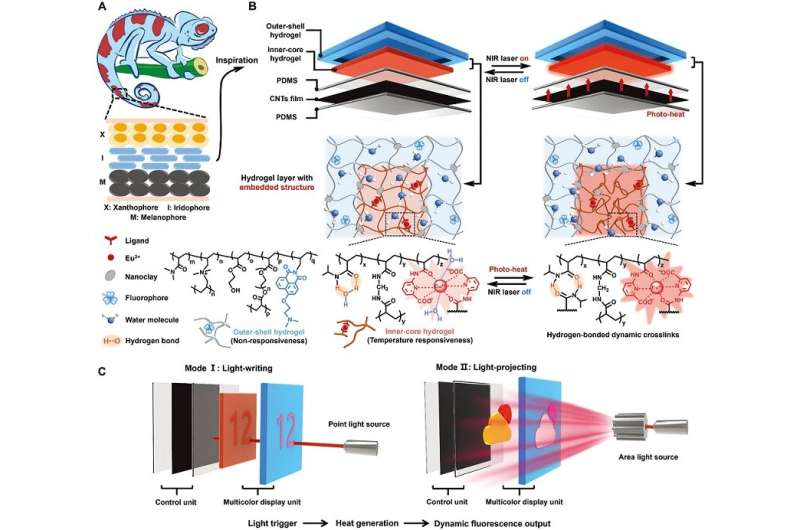Multicolor fluorescent hydrogel system with biomimetic vertical multilayer structure for on-demand information display. Credit: NIMTE
Researchers led by Prof. Chen Tao at the Ningbo Institute of Materials Technology and Engineering (NIMTE) of the Chinese Academy of Sciences has developed a flexible near-infrared light-writing multicolor hydrogel system for on-demand information display.
The study was published in Advanced Materials.
In the age of the Internet-of-Things, the development of smart rewritable display systems has great potential to reduce environmental pollution and resource consumption caused by the increasing amount of disposable electronic waste. They are promising candidates for information display and transmission.
However, it is still challenging to construct such systems combining various functionalities, such as remote control, rapid activation, multicolor and multimode display.
The unique vertical arrangement of multilayered chromatophores contributes to the reversible and multicolor pattern display in chameleon skin. Inspired by this exquisite structure, the researchers developed a novel flexible NIR-light-triggered rewritable multicolor hydrogel system for on-demand information display.
According to the researchers, the hydrogel system is in a vertically arranged multilayer structure consisting of a fluorescent hydrogel layer as the display unit and an efficient poly(dimethylsiloxane) (PDMS)-sealed carbon nanotubes (CNTs) film layer as the control unit.
Specifically, in the fluorescent hydrogel layer, a thermo-responsive fluorescent hydrogel as the inner core is confined within a non-responsive hydrogel, thus facilitating the stable, reversible, and multicolor information loading.
By the cascading process of light trigger/heat generation/fluorescence output, arbitrary information such as numbers and letters could be hand-written and displayed within five seconds using NIR light as a pen, and self-erased for another rewriting cycle within 36 seconds.
In addition to the light-writing display of transient information, this bio-inspired multilayer structure design was facilitated the easy patterning of both the photothermal CNTs layer and the fluorescent hydrogel display layer, thus realizing the sustainable light-projecting display of multicolor patterns.
This fluorescent hydrogel rewritable display system meets various requirements of information display or transmission, improves the information visualization effect and interactive experience, and may shed light on the further development of light-writing system.
More information: Shuxin Wei et al, Light‐Writing and Projecting Multicolor Fluorescent Hydrogels for On‐Demand Information Display, Advanced Materials (2023). DOI: 10.1002/adma.202300615
Journal information: Advanced Materials
Provided by Chinese Academy of Sciences
























